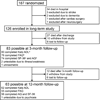Delirium in the ICU and subsequent long-term disability among survivors of mechanical ventilation
- PMID: 24158172
- PMCID: PMC3947028
- DOI: 10.1097/CCM.0b013e3182a645bd
Delirium in the ICU and subsequent long-term disability among survivors of mechanical ventilation
Abstract
Objective: Survivors of critical illness are frequently left with long-lasting disability. The association between delirium and disability in critically ill patients has not been described. We hypothesized that the duration of delirium in the ICU would be associated with subsequent disability and worse physical health status following a critical illness.
Design: Prospective cohort study nested within a randomized controlled trial of a paired sedation and ventilator weaning strategy.
Setting: A single-center tertiary-care hospital.
Patients: One hundred twenty-six survivors of a critical illness.
Measurements and main results: Confusion Assessment Method for the ICU, Katz activities of daily living, Functional Activities Questionnaire (measuring instrumental activities of daily living), Medical Outcomes Study 36-item Short Form General Health Survey Physical Components Score, and Awareness Questionnaire were used. Associations between delirium duration and outcomes were determined via proportional odds logistic regression with generalized estimating equations (for Katz activities of daily living and Functional Activities Questionnaire scores) or via generalized least squares regression (for Medical Outcomes Study 36-item Short Form General Health Survey Physical Components Score and Awareness Questionnaire scores). Excluding patients who died prior to follow-up but including those who withdrew or were lost to follow-up, we assessed 80 of 99 patients (81%) at 3 months and 63 of 87 patients (72%) at 12 months. After adjusting for covariates, delirium duration was associated with worse activities of daily living scores (p = 0.002) over the course of the 12-month study period but was not associated with worse instrumental activities of daily living scores (p = 0.15) or worse Medical Outcomes Study 36-item Short Form General Health Survey Physical Components Score (p = 0.58). Duration of delirium was also associated with lower Awareness Questionnaire Motor/Sensory Factors scores (p 0.02).
Conclusion: In the setting of critical illness, longer delirium duration is independently associated with increased odds of disability in activities of daily living and worse motor-sensory function in the following year. These data point to a need for further study into the determinants of functional outcomes in ICU survivors.
Conflict of interest statement
Dr. Thompson has disclosed that she does not have any potential conflicts of interest.
Figures


Comment in
-
Duration of delirium and postintensive care functional outcome: over the hill?Crit Care Med. 2014 Feb;42(2):466-7. doi: 10.1097/01.ccm.0000435679.14177.62. Crit Care Med. 2014. PMID: 24434453 No abstract available.
References
-
- Herridge MS, Tansey CM, Matte A, et al. Functional disability 5 years after acute respiratory distress syndrome. N Engl J Med. 2011;364(14):1293–1304. - PubMed
Publication types
MeSH terms
Grants and funding
- P30AG21342/AG/NIA NIH HHS/United States
- R01 AG035117/AG/NIA NIH HHS/United States
- K24AG021507/AG/NIA NIH HHS/United States
- AG027472/AG/NIA NIH HHS/United States
- AG034257/AG/NIA NIH HHS/United States
- K07 AG043587/AG/NIA NIH HHS/United States
- UL1 TR000445/TR/NCATS NIH HHS/United States
- T32HL087738/HL/NHLBI NIH HHS/United States
- K23 AG031322/AG/NIA NIH HHS/United States
- K23 AG034257/AG/NIA NIH HHS/United States
- 2UL1TR000445-06/TR/NCATS NIH HHS/United States
- P30 AG021342/AG/NIA NIH HHS/United States
- AG031322/AG/NIA NIH HHS/United States
- AG035117/AG/NIA NIH HHS/United States
- T32 HL087738/HL/NHLBI NIH HHS/United States
- R01 AG027472/AG/NIA NIH HHS/United States
- K24 AG021507/AG/NIA NIH HHS/United States
LinkOut - more resources
Full Text Sources
Other Literature Sources
Medical

